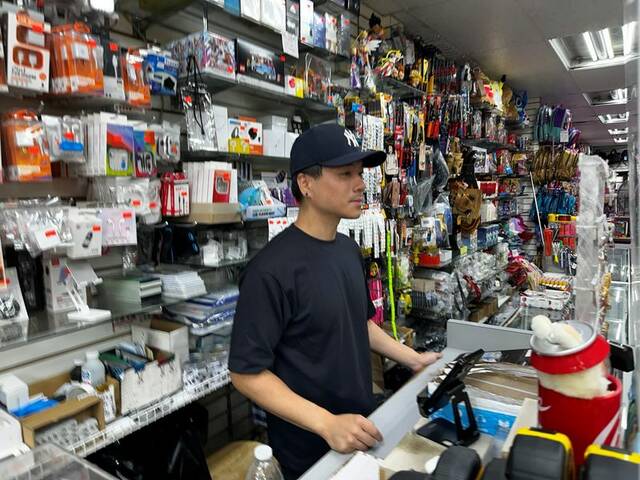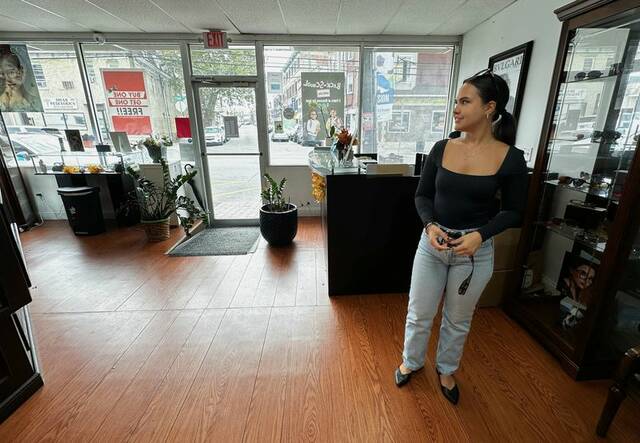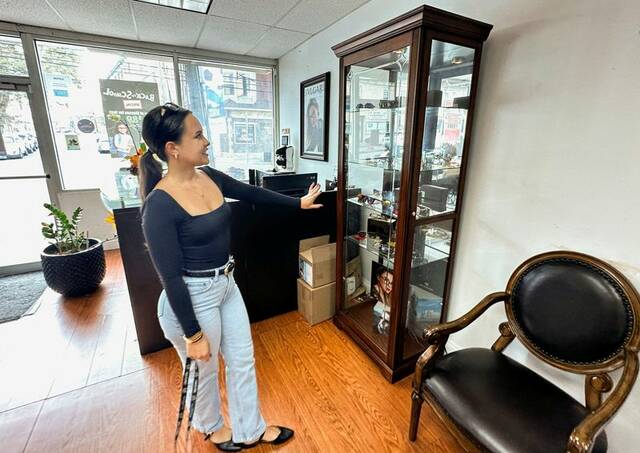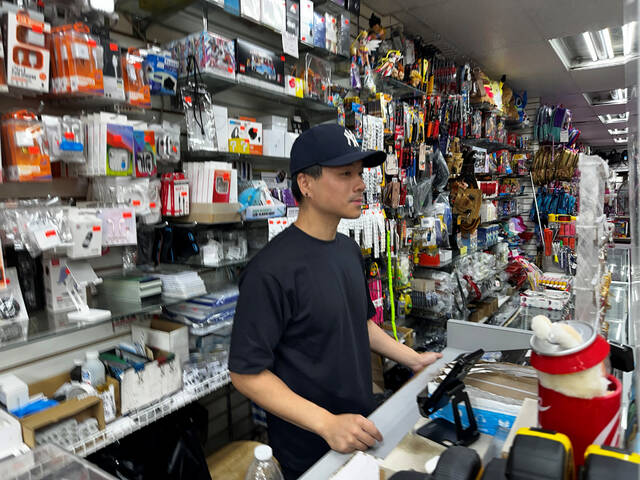Fearful of Trump's raids, some Hispanic shoppers turn to safety of online buying
NEW YORK/NEWARK — In Newark’s heavily Latino Ironbound district, Rosa Ludena works the register of the electronics shop she’s owned since 2003. A wall of phone cases appears on display behind her, but few shoppers are around to buy them. Traffic has slowed, and some of her customers have told her they fear leaving the house due to a spate of high-profile anti-immigration raids championed by U.S. President Donald Trump. Those actions - including a headline-grabbing raid of a fish market in January a few blocks from her store - have scared people into doing more shopping online, Ludena said.
“In this area, it’s a lot of Hispanics, and they are afraid to go out because of immigration raids,” says Ludena, 51, a U.S. citizen who emigrated from Ecuador in 1999. “If sales decrease, how will I pay rent?”
The Trump administration has conducted high-profile raids nationwide at Home Depot stores where day laborers often congregate, Walmart parking lots, strawberry and peach farms, and a Hyundai Motor battery plant.
The expanded approach to immigration enforcement has changed the routine for some Hispanic consumers, and businesses are seeing it, according to interviews and statements from two dozen people, including business owners, community leaders, analysts and CEOs of publicly traded companies.
“A shift to online purchasing in certain communities is unsurprising given concerns over changing immigration policies and their enforcement,” said Mark Mathews, chief economist at the National Retail Federation.
The White House, in response to Reuters’ reporting, reiterated that its immigration enforcement operations are focused on anti-crime efforts and that “making American communities safer will create an environment in which all businesses can thrive in the long term and their customers can feel safe.”
The administration has also previously said that non-criminals are also swept up in raids.
Vendors report sharp decline after raids
The trend is hurting business owners who lack an online presence, according to community advocates. Oliver de la Garza of Proyecto Azteca, a South Texas nonprofit that works with immigrants, said business at an Alamo, Texas, flea market slumped after an ICE raid at the market in June. Where there were once some 500 vendors, there are now around half that, he said. “These aren’t big businesses with websites,” de la Garza said. Reuters was not able to independently confirm the extent of the toll at the flea market.
Some major corporations are also noticing. Heineken CEO Dolf van den Brink said the company’s U.S. sales have been under pressure, including brands favored by Hispanic customers. He said at an October 23 investor event that “what’s happening with immigration, the ICE raids,” has caused Hispanic customers to be “highly disrupted.” The company did not respond to an additional request for comment.
Surveys by retail consultancy Kantar found that Hispanic consumers reported visiting stores less frequently across several categories. At mass retailers, self-reported visits by Hispanic shoppers fell 14.7% year-on-year between April and June, compared with a 4.5% decline among non-Hispanic groups like White, Asian and Black shoppers. At dollar stores, visits dropped nearly 6%, while other groups reported a 3% increase.
Several other consumer companies, including Constellation Brands and Coca-Cola, have noted declines with this group this year without explicitly referencing immigration policy.
Kantar’s shopper survey doesn’t ask respondents why they shop a certain way. But parallel Kantar research into the social and economic challenges facing Hispanic families showed that Hispanics this year are reporting a decline in their sense of personal safety, with “changes in immigration policy … heightening fear and uncertainty,” Kantar said.
That sentiment also applies to Hispanics who reside in the U.S. legally, said Julie Craig, Kantar’s vice president of shopper insights. “There is that fear of being harassed, and there is that fear of being kind of watched and singled out,” Craig said.
Still, Hispanic America, which comprises 19% of the U.S. population, is vast and diverse, and available data is too limited to draw definite conclusions about shopper behaviors, Reuters found. Kantar’s nationwide shopper survey polls about 36,000 people a year, around 7,000 of whom are Hispanic.
Trump came close to winning Hispanic voters in 2024, long a Democratic-leaning voting bloc, but his approval rating among Hispanics stood at just 32% in late October, Reuters/Ipsos polls show. Support for his immigration policy has also weakened, falling to 42% as of late October from 50% in February.
In May, Régis Schultz, CEO of sportswear chain JD Sports , said the company’s sister brand, Shoe Palace, saw a big drop in store visits between February and April, which he attributed to immigration enforcement. Shoe Palace caters to Hispanic shoppers and operates about 200 U.S. stores. The company did not respond to an additional request for comment or share specific numbers with Reuters.
“We have seen a huge decline in traffic, which I think is telling,” Schultz said on its May company earnings call, noting that the online business “has been OK” by comparison. “You can see definitively the impact of immigration policy on Shoe Palace,” he said. The company’s sales in its unit that includes Shoe Palace fell 5.5% in the February-April period from a year earlier.
A shift online
Hispanics’ buying power is projected to hit $2.8 trillion next year, increasing faster than any other group, according to Kantar; the percentage of Kantar survey respondents who reported shopping online reached 60% in the July-September quarter, its highest ever.
David Swartz, retail analyst with Morningstar, said the covid pandemic helped make online shopping routine. “E-commerce has been rising regardless,” he said, which has benefited the companies with big online platforms.
Foot traffic at Urban Eyes Vision Center in Newark, which sells glasses and eye accessories, dropped after the January fish market raid in the middle of what’s usually its busy season, said co-owner Valerie Bandras, 32. “People are afraid to go outside,” she said.
Online shopping favors large players
The manager of the Tien Rong Gift Shop in Newark, going only by Shan, reported weeks of sluggish sales at his family’s store, which sells everything from stuffed animals to imitation jewelry. “We can’t compete with the Walmarts of the world on price or an online presence,” he said. Reuters was unable to independently confirm the sales figures of both those private businesses. There is some evidence that larger stores without online channels have also suffered. Visits to Ross Stores - a mid-sized off-price chain popular with Latino shoppers - dropped this year through mid-July in Hispanic-heavy areas, with Walmart’s website picking up most defectors, according to research by brokerage firm Gordon-Haskett. The brokerage did not respond to requests for additional details. Ross Stores did not respond to multiple requests for comment.
Walmart’s online sales rose 26% in the May-to-July quarter from a year earlier, its strongest spring-to-summer period since the pandemic. A Walmart spokesperson said the retailer is seeing customers across all demographics increasingly choose pickup and delivery. The raids have altered investment in brick-and-mortar stores as well. Private equity giant Apollo Global Management is looking to sell Hispanic grocery chain Heritage Grocers Group, as fear of immigration raids weakens consumer demand among Latinos, Reuters reported on October 22, quoting people familiar with the situation. Neither Apollo nor Heritage responded to requests for comment.
Remove the ads from your TribLIVE reading experience but still support the journalists who create the content with TribLIVE Ad-Free.






